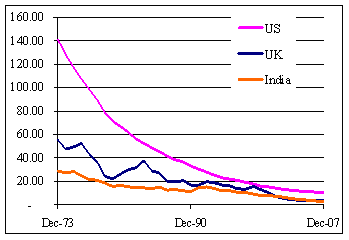Thank God, we cannot print Gold
Posted On Sunday, Nov 23, 2008
We often walk into a restaurant to have a lunch or dinner and usually pay with the local currency, since we are confident that the currency would be accepted by the restaurant as a medium of exchange. And what if the restaurant refuses to accept the currency notes offered by you? And the restaurant manager says, ‘I want something real that would not lose value’.
We would get a shock of our life... since we all are used to an environment where currency notes can be exchanged or traded for any goods and services.
Thinking aloud... if currency is the only form of money one holds and it’s not acceptable any more... Its trouble for all of us... since for years, we have been made to believe that currency is backed by the "faith in government" or "the confidence in it". But what will happen to the currency if there is no confidence or faith left?
Could it happen for real?
The global financial crisis that we are witnessing today is unprecedented and we are not out of the woods as yet. Many of the developed economies are at the brink of an impending recession. As a response to it, central banks globally are pumping in tonnes of money, to help stimulate the beleaguered economies and bail out the bankrupt investment banks. The U.S leads the pack in terms of monetary injections to help its economy back on its feet. Nothing is going right for US; plunging housing prices, severe job losses, rising default risks, growing deficits, massive portfolio losses, a deflation scare etc.
As a part of the bailout package, the US Federal Reserve and other central banks over the world would probably continue pumping in, the so called "liquidity" into the financial system by merely PRINTING MORE and MORE DOLLARS over time, which is not backed by any real assets such as gold; but only by a "faith in the government". Currency, thus, remains only a paper which is churned out in the printing presses. And technically, there is no limit to this printing i.e. no supply restrictions on paper currencies.
This leads to what economist call as "Debasement of the currency" i.e. an oversupply of paper currency because it just remains a piece of paper that can be created at will and in whatever quantity desired. Such actions of the central banks may lead to lack of confidence in the paper currency. Zimbabwe is a classic example of currency debasement, where one has to carry currency notes in large sacks to buy even groceries.
This is where a proxy currency such as "GOLD" holds intrinsic value, since the supply of it is limited and which is not in control of any Central Bank. Gold has a unique characteristic of "store of value", vis-à-vis paper currencies. Paper currencies tend to lose value over a period of time due to inflation (loss of purchasing power) caused by over supply as it leads to a situation where more and more currency is required to buy the same amount of goods.
We tried to compare the currency in circulation issued and the corresponding gold held by Central banks in developed countries such as US & UK. We divided the gold reserves (in tonnes) held by central bank with the currency in circulation (in bn dollars) of that country. And the result was not surprising. Gold held by such central banks relative to the currencies issued by them has fallen considerably over the last few decades, especially in US.
For e.g.: In the U.S, in 1973 gold held by central bank was 8,584 tonnes and currency in circulation was $61 bn. If we divide the gold held by the currency in circulation, we get a ratio of 141.2 i.e. 141.2 tonnes were held per 1 billion of currency in circulation. In 2007, the U.S central bank held 8,133 tonnes and the money in circulation was $759 bn. The ratio has now become 10.7 i.e. only 10.7 tonnes of gold held per billion dollars in circulation.

Source: Bloomberg, World Gold Council
*Ratio of Gold (in tonnes) to currency (in bn dollars) in circulation
i.e. tonnes of gold per bn dollars in circulation
The falling trend as seen in the graph indicates that more and more paper currency issues in circulation is backed by less and less gold. The backing comes only in form of the faith in the Government, which is fast dwindling due to the financial crisis and the massive bail outs, especially in US.
If the U.S were to get back to the ratio of gold held per billion dollars in circulation as to its 1973 level of 141, then they would have to increase its gold reserves to 107,153 tonnes as against current holdings of 8,133 tonnes, an increase of more than 13 times!
With the financial crisis not over yet and the recession looming large, central banks would continue to inject more and more money into the financial system. Thus the debasement of the currencies will continue making Gold more and more attractive as a hedge against the dwindling purchasing power and the loss of faith and confidence in paper currencies.
Thank God we don’t have Printing Presses for Gold- the only keeper of value over the long term.
Gold is seriously undervalued.
Buy gold before it gets expensive.
Related Posts
-

Gold Monthly for February 2026
Posted On Tuesday, Feb 03, 2026
Gold began the new year on a strong footing, carrying forward the momentum from the previous year and extending its upward rally.
Read More -

Equity Monthly for February 2026
Posted On Monday, Feb 02, 2026
Markets continued to be under pressure with Sensex declining by 3.4%.
Read More -

Debt Monthly for February 2026
Posted On Monday, Feb 02, 2026
In FYTD26, Indian bond yields defied expectations, firming up even as monetary policy turned supportive.
Read More




